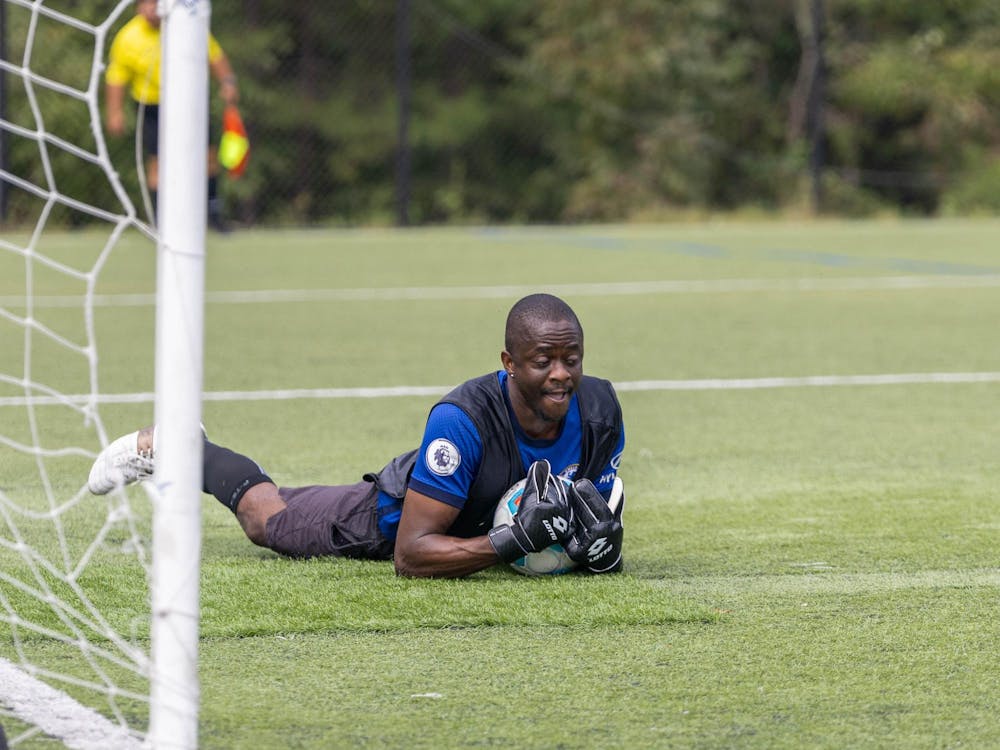Taofik Oyekunle’s royal blue Chelsea FC jersey flashes bright against the turf in Herndon Park as he dives to make a save. For Oyekunle, soccer is always serious; he hasn’t missed a Saturday morning pickup game in 12 years.
Oyekunle’s team — the RDU Stars — usually forgoes the formality of goalkeeping, but for the tournament Sept. 14, the players nominated their captain to tend goal. He comes prepared with thick black goalkeeping gloves and an utter lack of fear. From his position in the box, Oyekunle shouts directions to his teammates across the field, who call back in an assortment of different languages.
The men on the RDU Stars grew up all over the globe: Oyekunle moved to Durham from Nigeria, while his teammate Sybren Grant called Jamaica home until 2019. Like always, Saturday morning has brought them together for soccer — but this week, there’s more to it.
For 13 years, Durham has hosted Welcoming Week, a campaign for immigrants and refugees to feel included in the local community. This year, for the second time, Welcoming Week included a one-day, eight-team soccer tournament, encouraging immigrants from 48 countries to share in a celebration of the world’s game.

“Welcoming Week is an opportunity for local government to open the doors to the immigrant community so they can learn what the city has for them,” says Kokou Nayo, one of the tournament’s coordinators.
Durham county is home to approximately 46,000 foreign-born residents, roughly 15% of the population. This percentage is the second largest in North Carolina, following Mecklenburg County with 16%. According to Nayo, who is also the Durham City-County Immigrant and Refugee Affairs Coordinator, Durham’s appeal is tied to the wide-ranging historic and current work opportunities, education and a generally welcoming community.
“I think the universities, the economy, the community, all provide the opportunity for folks to feel at home,” Nayo says.
According to Jennie Belle, the City of Durham’s Community Engagement Strategist, Durham is fit to house large immigrant populations due to its wide-reaching public transportation systems. The city also has strong ESL and dual-immersion programs in its public school system, along with work opportunities — in part due to large construction projects for rapidly growing local infrastructure.
Education drew Oyekunle to Durham. He came to the United States at 30 to get a master’s degree in physics at North Carolina Central University. He earned his third degree from North Carolina. Oyekunle and his family have lived in Mebane for eight years now, but he still makes the half-hour trek to Durham every Saturday to captain the Stars.
“I work from home,” Oyekunle says — he’s a statistician. “It’s very important that we get out there to make the blood flow.”
Grant will play whatever position the Stars need him for. “I’m a team player,” he says.
Like Oyekunle, Grant has been playing pick-up with the group nearly every Saturday morning. His wife heard about the team and signed him up after their family’s move from Jamaica five years ago. Grant is happy to be here — not just for love of soccer, but because events like Welcoming Week remind him of where he’s from.
“This is beautiful,” he says. “I like community events — we used to do them back home.”
This is the second year Grant has participated in the Welcoming Week tournament. He likes that something as simple as a soccer ball can bring together so many different people.
“It’s great for the community, great for Durham,” Grant says. “I wish we were able to do this every day.”

Three years ago, the City of Durham joined in the Welcoming Week effort, partnering with Durham County to extend the campaign’s impact. Previously, the week consisted of a few small, localized events, but now it is more heavily advertised and focused on improving the lives of refugees and immigrants in the community. Welcoming Week consists of three major events: the soccer tournament, local government proclamations and an immigrant and refugee career and resource fair.
The participants of the soccer tournament mostly consist of already-formed teams, like the RDU Stars, or their opponent, Bull City Futsal. According to Belle, Durham locals are eager to volunteer at community-building events.

Get The Chronicle straight to your inbox
Sign up for our weekly newsletter. Cancel at any time.
Elizabeth and Roland Tita have a line of folding tables set up outside the soccer field, where their son, Ramie, is helping the Stars fend off Bull City Futsal. The Tita's, in the early stages of a family catering business, have brought with them the local flavors of Cameroon, Ghana and Nigeria. When the match finishes, the players can feast on soya — grilled beef in a spicy dry rub — and puff puff, a deep-fried dough.
Like food, the "Beautiful Game" famously serves as a connecting force between people from across the globe, as, according to Nayo, “all you need is a ball and twenty-two people." Welcoming Week's growth and success has hinged on this principle of simplicity, as it reminds the Durham community how easy it is to come together.

Sophie Levenson is a Trinity junior and a sports managing editor of The Chronicle's 120th volume.

